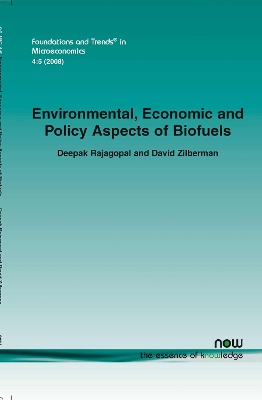Foundations and Trends (R) in Microeconomics
1 total work
Environmental, Economic and Policy Aspects of Biofuels
by Deepak Rajagopal and David Zilberman
Published 13 October 2008
Environmental, Economic and Policy Aspects of Biofuels provides a timely summary of the current issues contributing to the policy debates on this emerging and important topic. The authors make several key conclusions: Biofuels are diverse and evolving. The next generation of biofuels has the potential to provide improved net benefits but requires significant technological breakthroughs. Greenhouse gas (GHG) benefits vary significantly across various types of biofuels and are dependent on market conditions and policy situation.
While biofuel improves the welfare of gasoline consumers and food producers, it has a significant negative affect on food consumers, especially the poor. A diverse set of policies, which have been introduced or proposed, impact biofuels directly including subsidies, mandates, and regulation of carbon content of fuels. However, current policies do not provide incentives that align private and social welfare. Much of the impact assessments of biofuels thus far are ex-ante estimates based on either optimization or equilibrium models. There is a lack of ex-post econometric analysis of the marginal impact of biofuels and biofuel policies on the economy. And the structural relationships between agriculture, the energy sector, and the environment in the context of biofuels have hardly been studied.
The biofuel policy debate is likely to be an ongoing one in the near future and Environmental, Economic and Policy Aspects of Biofuels should be required reading for anyone interested in understanding this diverse and growing literature.
While biofuel improves the welfare of gasoline consumers and food producers, it has a significant negative affect on food consumers, especially the poor. A diverse set of policies, which have been introduced or proposed, impact biofuels directly including subsidies, mandates, and regulation of carbon content of fuels. However, current policies do not provide incentives that align private and social welfare. Much of the impact assessments of biofuels thus far are ex-ante estimates based on either optimization or equilibrium models. There is a lack of ex-post econometric analysis of the marginal impact of biofuels and biofuel policies on the economy. And the structural relationships between agriculture, the energy sector, and the environment in the context of biofuels have hardly been studied.
The biofuel policy debate is likely to be an ongoing one in the near future and Environmental, Economic and Policy Aspects of Biofuels should be required reading for anyone interested in understanding this diverse and growing literature.
